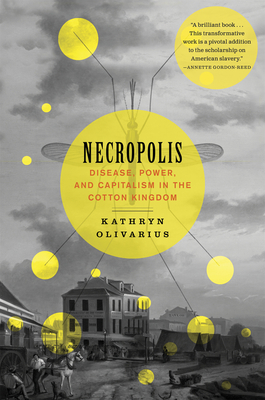Necropolis: Disease, Power, and Capitalism in the Cotton Kingdom

Necropolis: Disease, Power, and Capitalism in the Cotton Kingdom
Winner of the Frederick Jackson Turner Award
Winner of James H. Broussard Best First Book Prize, SHEAR
Winner of the Kemper and Leila Williams Prize in Louisiana History
Winner of the Humanities Book of the Year Award, Louisiana Endowment for the Humanities
--Annette Gordon-Reed "A stunning account of 'high-risk, high-reward' profiteering in the yellow fever-ridden Crescent City...a world in which a deadly virus altered every aspect of a brutal social system, exacerbating savage inequalities of enslavement, race, and class."
--John Fabian Witt, author of American Contagions "Olivarius's new perspectives on yellow fever, immunocapitalism, and the politics of acclimation...will influence a generation of scholars to come on the intersections of racism, slavery, and public health."
--The Lancet In antebellum New Orleans, at the heart of America's slave and cotton kingdoms, epidemics of yellow fever killed as many as 150,000 people. With little understanding of the origins of the illness--and meager public health infrastructure--one's only hope if infected was to survive, providing the lucky few with a mysterious form of immunity. Repeated epidemics bolstered New Orleans's strict racial hierarchy by introducing another hierarchy, a form of "immunocapital," as white survivors leveraged their immunity to pursue economic and political advancement while enslaved Blacks were relegated to the most grueling labor. The question of health--who has it, who doesn't, and why--is always in part political. Necropolis shows how powerful nineteenth-century Orleanians constructed a society that capitalized on mortal risk and benefited from the chaos that ensued.
PRP: 170.11 Lei
Acesta este Prețul Recomandat de Producător. Prețul de vânzare al produsului este afișat mai jos.
153.10Lei
153.10Lei
170.11 LeiLivrare in 2-4 saptamani
Descrierea produsului
Winner of the Frederick Jackson Turner Award
Winner of James H. Broussard Best First Book Prize, SHEAR
Winner of the Kemper and Leila Williams Prize in Louisiana History
Winner of the Humanities Book of the Year Award, Louisiana Endowment for the Humanities
--Annette Gordon-Reed "A stunning account of 'high-risk, high-reward' profiteering in the yellow fever-ridden Crescent City...a world in which a deadly virus altered every aspect of a brutal social system, exacerbating savage inequalities of enslavement, race, and class."
--John Fabian Witt, author of American Contagions "Olivarius's new perspectives on yellow fever, immunocapitalism, and the politics of acclimation...will influence a generation of scholars to come on the intersections of racism, slavery, and public health."
--The Lancet In antebellum New Orleans, at the heart of America's slave and cotton kingdoms, epidemics of yellow fever killed as many as 150,000 people. With little understanding of the origins of the illness--and meager public health infrastructure--one's only hope if infected was to survive, providing the lucky few with a mysterious form of immunity. Repeated epidemics bolstered New Orleans's strict racial hierarchy by introducing another hierarchy, a form of "immunocapital," as white survivors leveraged their immunity to pursue economic and political advancement while enslaved Blacks were relegated to the most grueling labor. The question of health--who has it, who doesn't, and why--is always in part political. Necropolis shows how powerful nineteenth-century Orleanians constructed a society that capitalized on mortal risk and benefited from the chaos that ensued.
Detaliile produsului









